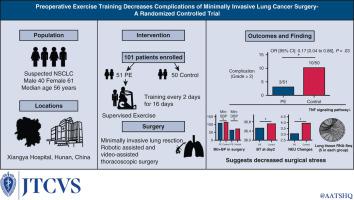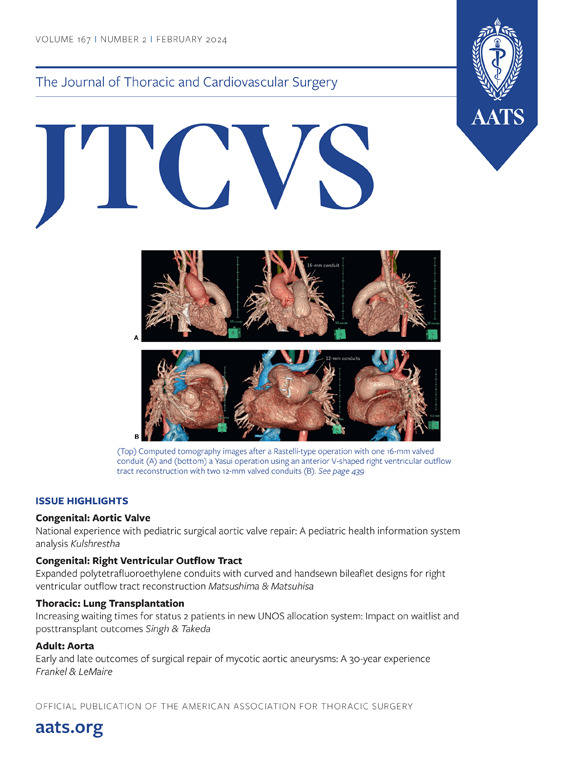术前运动训练可减少微创肺癌手术并发症--一项随机对照试验。
IF 4.9
1区 医学
Q1 CARDIAC & CARDIOVASCULAR SYSTEMS
Journal of Thoracic and Cardiovascular Surgery
Pub Date : 2025-02-01
DOI:10.1016/j.jtcvs.2024.04.009
引用次数: 0
摘要
本文章由计算机程序翻译,如有差异,请以英文原文为准。

Preoperative exercise training decreases complications of minimally invasive lung cancer surgery: A randomized controlled trial
Objective
Limited evidence exists regarding the efficacy of preoperative exercise in reducing short-term complications after minimally invasive surgery in patients with non–small cell lung cancer. This study aims to investigate the impact of preoperative exercise on short-term complications after minimally invasive lung resection.
Methods
In this prospective, open-label, randomized (1:1) controlled trial at Xiangya Hospital, China (September 2020 to February 2022), patients were randomly assigned to a preoperative exercise group with 16-day alternate supervised exercise or a control group. The primary outcome assessed was short-term postoperative complications, with a follow-up period of 30 days postsurgery.
Results
A total of 124 patients were recruited (preoperative exercise group n = 62; control n = 62). Finally, 101 patients (preoperative exercise group; n = 51 and control; n = 50) with a median age of 56 years (interquartile range, 50-62 years) completed the study. Compared with the control group, the preoperative exercise group showed fewer postoperative complications (preoperative exercise 3/51 vs control 10/50; odds ratio, 0.17; 95% CI, 0.04-0.86; P = .03) and shorter hospital stays (mean difference, −2; 95% CI, −3 to −1; P = .01). Preoperative exercise significantly improved depression, stress, functional capacity, and quality of life (all P < .05) before surgery. Furthermore, preoperative exercise demonstrated a significantly lower minimum blood pressure during surgery and lower increases in body temperature on day 2 after surgery, neutrophil-to-lymphocyte ratio, and neutrophil count after surgery (all P < .05). Exploratory research on lung tissue RNA sequencing (5 in each group) showed downregulation of the tumor necrosis factor signaling pathway in the preoperative exercise group compared with the control group.
Conclusions
Preoperative exercise training decreased short-term postoperative complications in patients with non–small cell lung cancer.
求助全文
通过发布文献求助,成功后即可免费获取论文全文。
去求助
来源期刊
CiteScore
11.20
自引率
10.00%
发文量
1079
审稿时长
68 days
期刊介绍:
The Journal of Thoracic and Cardiovascular Surgery presents original, peer-reviewed articles on diseases of the heart, great vessels, lungs and thorax with emphasis on surgical interventions. An official publication of The American Association for Thoracic Surgery and The Western Thoracic Surgical Association, the Journal focuses on techniques and developments in acquired cardiac surgery, congenital cardiac repair, thoracic procedures, heart and lung transplantation, mechanical circulatory support and other procedures.

 求助内容:
求助内容: 应助结果提醒方式:
应助结果提醒方式:


